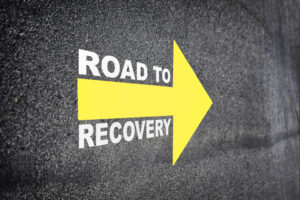5 tips for your recovery journey
Posted on 31 May, 2024 in Info

The road to recovery beings with a first step: acknowledging you have a problem with alcohol or drugs, which can be the most difficult step to take. Once you are on the road to recovery, there will likely be bumps along the way, so here are five key tips to help you stay on track and make the most of your recovery journey.
- Establish a Support System
A strong support network will help you through the tougher times of your recovery process. There will be good days and bad, and you will benefit from encouragement and guidance from people you know and trust, people who have also been through recovery, or perhaps community groups, such as Alcoholics Anonymous. Even online forums and platforms can be good places to find comfort and inspiration from others who have been through recovery.
- Establish Coping Strategies
Coping mechanisms will be learnt during your recovery, but everyone is different so it’s important to identify what coping strategies work for you. Keep a log of trigger points and the best ways you have found to navigate these challenging point and return to the log regularly to ensure you know what to do when they occur.
Mindfulness, meditation, yoga and physical exercise can all be really helpful, enabling you clear your head and see everything from a different perspective, helping you to overcome the obstacles in your recovery.
- Establish a Routine
A structured routine is a hugely important part of recovery. A well structured routine can help to reduce stress and minimise trigger points that could lead to relapse.
Plan out your days, have a weekly schedule, and set times for exercise, meals, bedtime, etc.
- Work on Your Physical Health
Your physical health plays a vital role in your recovery. Substance abuse can take a toll on your body, so it’s important to work on your physical well-being. A scheduled exercise plan in your routine can be fantastic for improving your physical and mental health. Exercise releases endorphins, which help reduce stress and anxiety and generally improve your mood.
Nutrition is also crucial. Plan to eat a balanced diet. Proper nutrition helps repair the damage caused by substance abuse and provides the energy needed to support your recovery. Equally important is good sleep, as rest is vital for both physical and mental health.
- Celebrate Milestones and Progress
Your recovery is a journey rather than an event, so it’s important to acknowledge and celebrate milestones along the way. Setting small, achievable goals and recognising when you meet them can do wonders for your sense of motivation and self-esteem. These goals can be certain stages along your recovery journey, such as reaching a target number of days sober, or personal achievements, like developing a new skill or hobby.
Celebrate by perhaps rewarding yourself with something, like a nice meal or time with friends and family. Milestones are there to remind you of how far you’ve come.
